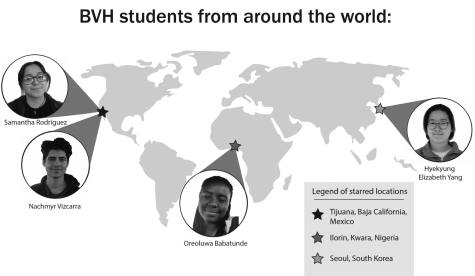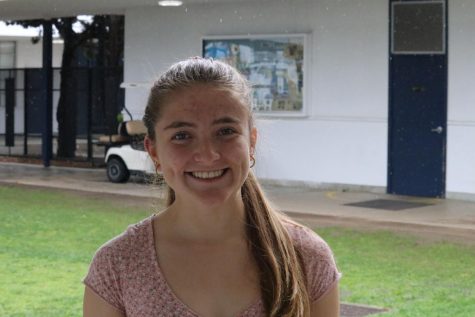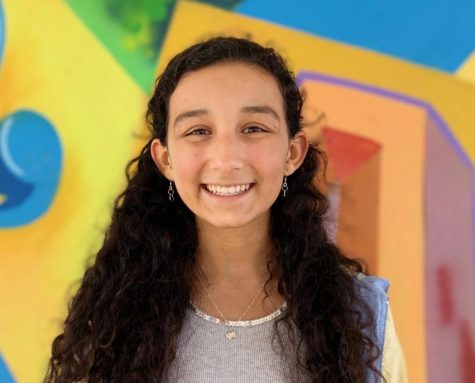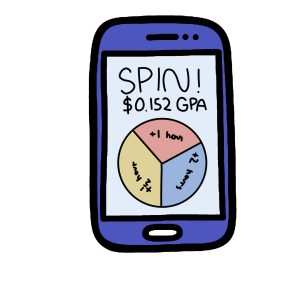More than a change in scenery
Exploring the stories of immigrant students at BVH
October 29, 2019

Graphic by Lucia Rivera. Photos by Lilyanna Luna-Salazar and Lucia Rivera. Center photo provided by Oreoluwa Babatunde.
He did not realize how much his life was going to change. The image of what his new home would look like had not formed in his mind either. An immigrant to the United States like many other students at Bonita Vista High (BVH), junior Nachmyr Vizcarra was finishing the sixth grade when he left Tijuana, Mexico to embark on a new journey.
“I didn’t fully realize how important it was, and I got sad that I was going [to] leave my family and friends behind,” Vizcarra said.
His family made the decision to move to the US when his mother got married and wanted to provide a better future for him and his brothers. According to Vizcarra, there is a lot of violence and crimes in Tijuana, where he comes from. He described the conditions of his childhood environment as dirty and polluted. Arriving in the US was a shift for Vizcarra because it was more secure than Tijuana.
“I expected that it was going to be way more secure and everything was going to be better. I realized how much cleaner everything was and how much safer it was here. I was pretty amazed about that,” Vizcarra said.
However, adapting to life in the US was described as “hard” due to the language barrier. It took Vizcarra two years to become fluent in English.
“When I first got here I couldn’t speak English, and people made fun of me. The worst thing [was] that I [didn’t] even realize it because I couldn’t understand a word of what they were saying, until one of my friends told me. Not only that, but they were calling me [names],” Vizcarra said.
During middle school, Vizcarra faced physical abuse which caused him to want to avoid his classes. He was approached by an office administrator and was told to alert them if he ever found himself in that situation again.
“[When] I finally [learned to] speak English, I noticed that I wasn’t getting excluded from activities or being made fun of as much. I know that not everyone’s going to be a nice person in the world, but back then in middle school it really affected me a lot,” Vizcarra said.
Another student who was born in Tijuana is junior Samantha Rodriguez who took a 24-hour car drive from her home in Mexico to Memphis, Tennessee when she was three years old. Rodriguez’s home in Tijuana was next to a factory, which played a role on why Rodriguez’s family moved to the US.
Rodriguez originally went to a highly Latin American-populated school but transferred when her father got a new job,which allowed him to pay for Rodriguez to go to a private school. Like Vizcarra, one of the biggest shifts and challenges for Rodriguez was having to learn English.
“[At my private school] I would pretend to [have been] born in the US because [the people at that school] would always say stuff about Latino people. They would be making fun of our skin tone or [the] language [and] they would criticize [Latino culture] in front of me. So I would pretend that I didn’t know how to speak Spanish [and] that I wasn’t born in Mexico,” Rodriguez said.
Rodriguez’s parents noticed how she began to hide her native language once she would only speak to them in English. She would also not reply to her parents in her native language when they were at school events.
“I [had] to hide my identity, [which] impacted me because later on [as] I would struggle with whether or not I was even Mexican to begin with. I pretended so much to the point [that] I lost my Hispanic side,” Rodriguez said.
Rodriguez moved to California in 2016 and noticed that people were more open-minded, which made her feel much more comfortable in San Diego versus Memphis.
“That whole thing [of] me messing around with my identity has shaped me into the person I am today. I feel like I’m more open and more accepting of my own culture, myself and my color. Because of that, I’m not afraid to speak my native language anymore,” Rodriguez said.
While both Vizcarra and Rodriguez immigrated from relatively near San Diego, other BVH students who immigrated with their families come from many areas of the world, including other continents. One example of this is senior Oreoluwa Babatunde, who moved to the US when she was four due to her parents wanting better education and opportunity for their children.
“My dad was an accountant and my mom was a nurse, but you can’t really go far if you [receive] your education in [Ilorin], Nigeria. When we moved here, my parents had to go to school again because the college credits didn’t transfer,” Babadunte said.
The educational system is not the only difference Babatunde noticed. Since Nigeria is located near the equator, the weather is humid and tropical. Nigeria also has large lands and high biodiversity, housing a variety of species.
“It was definitely a lot hotter there. There was a lot of nature and a lot of bugs – it was very animal-oriented. And agriculture was what they based everything on,” Babatunde said.
Babatunde expressed how her adventurous nature helped her overcome one challenge of moving to the US. Even though she had to restart her life and face challenges she stated that she did not feel out of place.
“It was a little challenging to adapt because of the people and the variety of different cultures. I don’t think it was hard adapting, but coming from Nigeria, where [there] was a specific culture, to the US, where [there] was a variety of cultures, was different. But I was a kid who liked to explore, so it wasn’t too difficult for me,” Babadunte said.
A country’s culture can mean many things – how they eat, how they celebrate traditions and more. Babatunde addressed a difference in culture she witnessed between Nigeria and the US while living here throughout her life.
“Food is different -you can get bigger here if you eat the food. The food that we have is different, and it serves a purpose. People in Nigeria are a lot skinnier than the people in the US. People in Nigeria eat for nourishment and not for pleasure,” Babadunte said.
Another student who immigrated to the United States is senior Hyekyung Elizabeth Yang who came from Seoul, South Korea when she was in sixth grade because her dad got a new job. Yang had perspectives before coming in the US.
“I thought schools would have lockers, [but my first impression of America was that they have] good food,” Yang said.
Through the highs and lows, students from outside the country coming to the US for greater opportunities end up adapting to the new culture without compromising its own.
“I feel like I’m more open and more accepting of my own culture and of myself and my color. Because of that, and I’m not afraid to speak my native language anymore because of how more open I feel ever since then. And since the whole movement of being able to accept people of color I feel more comfortable and I feel like that’s shaped me more as a person,” Rodriguez said.







